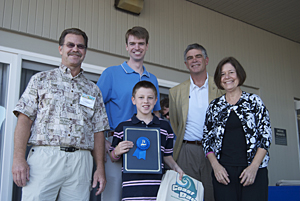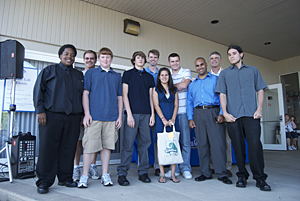
- Rozovsky wins prestigious NSF Early Career Award
- UD students meet alumni, experience 'closing bell' at NYSE
- Newark Police seek assistance in identifying suspects in robbery
- Rivlin says bipartisan budget action, stronger budget rules key to reversing debt
- Stink bugs shouldn't pose problem until late summer
- Gao to honor Placido Domingo in Washington performance
- Adopt-A-Highway project keeps Lewes road clean
- WVUD's Radiothon fundraiser runs April 1-10
- W.D. Snodgrass Symposium to honor Pulitzer winner
- New guide helps cancer patients manage symptoms
- UD in the News, March 25, 2011
- For the Record, March 25, 2011
- Public opinion expert discusses world views of U.S. in Global Agenda series
- Congressional delegation, dean laud Center for Community Research and Service program
- Center for Political Communication sets symposium on politics, entertainment
- Students work to raise funds, awareness of domestic violence
- Equestrian team wins regional championship in Western riding
- Markell, Harker stress importance of agriculture to Delaware's economy
- Carol A. Ammon MBA Case Competition winners announced
- Prof presents blood-clotting studies at Gordon Research Conference
- Sexual Assault Awareness Month events, programs announced
- Stay connected with Sea Grant, CEOE e-newsletter
- A message to UD regarding the tragedy in Japan
- More News >>
- March 31-May 14: REP stages Neil Simon's 'The Good Doctor'
- April 2: Newark plans annual 'wine and dine'
- April 5: Expert perspective on U.S. health care
- April 5: Comedian Ace Guillen to visit Scrounge
- April 6, May 4: School of Nursing sponsors research lecture series
- April 6-May 4: Confucius Institute presents Chinese Film Series on Wednesdays
- April 6: IPCC's Pachauri to discuss sustainable development in DENIN Dialogue Series
- April 7: 'WVUDstock' radiothon concert announced
- April 8: English Language Institute presents 'Arts in Translation'
- April 9: Green and Healthy Living Expo planned at The Bob
- April 9: Center for Political Communication to host Onion editor
- April 10: Alumni Easter Egg-stravaganza planned
- April 11: CDS session to focus on visual assistive technologies
- April 12: T.J. Stiles to speak at UDLA annual dinner
- April 15, 16: Annual UD push lawnmower tune-up scheduled
- April 15, 16: Master Players series presents iMusic 4, China Magpie
- April 15, 16: Delaware Symphony, UD chorus to perform Mahler work
- April 18: Former NFL Coach Bill Cowher featured in UD Speaks
- April 21-24: Sesame Street Live brings Elmo and friends to The Bob
- April 30: Save the date for Ag Day 2011 at UD
- April 30: Symposium to consider 'Frontiers at the Chemistry-Biology Interface'
- April 30-May 1: Relay for Life set at Delaware Field House
- May 4: Delaware Membrane Protein Symposium announced
- May 5: Northwestern University's Leon Keer to deliver Kerr lecture
- May 7: Women's volleyball team to host second annual Spring Fling
- Through May 3: SPPA announces speakers for 10th annual lecture series
- Through May 4: Global Agenda sees U.S. through others' eyes; World Bank president to speak
- Through May 4: 'Research on Race, Ethnicity, Culture' topic of series
- Through May 9: Black American Studies announces lecture series
- Through May 11: 'Challenges in Jewish Culture' lecture series announced
- Through May 11: Area Studies research featured in speaker series
- Through June 5: 'Andy Warhol: Behind the Camera' on view in Old College Gallery
- Through July 15: 'Bodyscapes' on view at Mechanical Hall Gallery
- More What's Happening >>
- UD calendar >>
- Middle States evaluation team on campus April 5
- Phipps named HR Liaison of the Quarter
- Senior wins iPad for participating in assessment study
- April 19: Procurement Services schedules information sessions
- UD Bookstore announces spring break hours
- HealthyU Wellness Program encourages employees to 'Step into Spring'
- April 8-29: Faculty roundtable series considers student engagement
- GRE is changing; learn more at April 15 info session
- April 30: UD Evening with Blue Rocks set for employees
- Morris Library to be open 24/7 during final exams
- More Campus FYI >>
7:59 a.m., Oct. 9, 2009----The winners of two Coast Day 2009 contests for Delaware school kids were honored during a ceremony at the University of Delaware event, held Sunday, Oct. 4, at UD's Hugh R. Sharp Campus in Lewes.
Coast Day, sponsored by UD's College of Earth, Ocean, and Environment (CEOE) and the Delaware Sea Grant College Program, highlights the state's coastal resources. With that in mind, both contests asked students to reflect on the Coast Day 2009 theme, “Climate Change and Our Coast.”
Sam Schubert, a student in Marilyn Vallejo's class at St. Ann School in Wilmington, took first prize in the Fifth-Grade Essay Contest for his essay “Facing Climate Change in Delaware.”
In Coast Day's new High School Video Contest, a group of students from Caesar Rodney High School in Camden, earned top prize for their submission, “Recycle Now!”
The Coast Day Fifth-Grade Essay Contest asked kids to choose one effect climate change may have on Delaware and ideas for helping limit that impact. Schubert wrote about the effects of sea-level rise and some steps people can take to mitigate it, including switching to energy-saving light bulbs.
“Changing to energy-saving light bulbs can help reduce the amount of electricity used in your home,” he wrote, adding that “by telling people about global warming and by telling them how to change to make thing better, we can make sure that future generations learn how to do things right.” (The complete essay can be found below.)
Taking second place was Hailey DeCelles, a student in Joan Balback's class at East Millsboro Elementary School. DeCelles' essay “Save Our Ocean!” discussed the accumulation of too much carbon dioxide in the ocean. Third place went to Kellen Sweeney. Sweeney, also a student in Marilyn Vallejo's class at St. Ann School, wrote about sea-level rise and proposed building an artificial reef off the coast.
Three honorable mention essayists also were recognized at the ceremony: Hayley McCabe, in Robin Hall's class at East Millsboro Elementary School; Jordyn Virden, in Jacquie Kisiel's class at Rehoboth Elementary School; and Brook Ward, also in Robin Hall's class at East Millsboro Elementary.
The winning students, who were selected based on the accuracy and originality of their essays, received bookstore gift certificates. The teachers of the winning students also received resource materials for use in their classrooms.
In the High School Video Contest, taking first prize were Zachary Dailey, Tyler Stokes, Zachary Johnson, Colin Kent, Alexia Ratajack, Ryan Norfleet, and John Bubniak, under the direction of teacher Paris Crockett. The group earned a Flip Video UltraHD camcorder for their school.
The competition's prompt asked the students to share their thoughts on climate change and be creative -- they could submit their videos as animations, photo slide shows, or live action as long as they kept it under two minutes.
The winning group's submission featured the students on location at their school discussing the various ways climate change affects the natural environment as well as their own lives. The video points to recycling as one useful approach for dealing with the problem. You can view the video at Delaware Sea Grant's YouTube channel.
Crockett, who annually asks his students to get involved with Coast Day in some way, praised the video contest idea. He said it allowed students with various strengths to work together for a great final product - one student had video experience while others had knowledge of the environment from their involvement with the school's Earth club.
“We live in a technological world,” he said. “This really allowed them to get creative.”
At the ceremony, CEOE Dean and Delaware Sea Grant Director Nancy Targett, along with UD President Patrick Harker, Delaware Department of Natural Resources and Environmental Control Secretary Collin O'Mara, and Lewes Mayor Jim Ford congratulated the winners at the Coast Day kick-off ceremony and presented them with their awards.
For more information about Coast Day, visit the Web site or call (302) 831-8083.
Following is the winning essay by Sam Schubert:
Facing Climate Change in Delaware
Over the last ten to twenty years, many people have argued over the effects of Global Warming on our planet. Scientists and world-wide leaders have different opinions on how to correct this problem. I will discuss how this problem started and what we can do locally to stop global warming.
Global warming is an average increase in the temperature near the Earth's surface. Global warming can be caused by both natural and human reasons. Before 1900, things like volcano eruptions and the sun's intensity would have been the primary cause for change in temperature. Human activities have most likely created the biggest changes in Global Warming in recent years. Earth's surface has increased by about 1.2 to 1.4 degrees Fahrenheit since 1900. Use of coal, natural gas, oil and gasoline, factories, utilities and appliances has had the most effect. These activities increase carbon dioxide and methane in the air which create the increase in the Earth's temperature. The effects of Global Warming have mainly made changes to the amount of the greenhouse gases, temperature changes, storm and weather changes and the changes in ocean currents.
Global Warming effects are already showing in Delaware. In Lewes, sea level has already risen by 12 inches in the last century. Some believe that it will rise 23 more inches by the year 2100. This would have a huge impact on the Delaware Bay wildlife. Deeper water will make it harder for ducks and geese to live in the area since they rely on shallow water to live. Shore erosion costs millions of dollars. Loss of the shoreline might mean people won't go to the beach and then there will be less people visiting over the summer. This would greatly hurt Delaware's economy.
There are some things that we can do to help. Change five lights to energy-saving light bulbs. Use green power and wind power. Reduce, reuse and recycle. Tell people and help them to understand what Global Warming does and how we can change it.
Changing to energy-saving light bulbs can help reduce the amount of electricity used in your home. If every house changed to just five of these, we could prevent greenhouse gases equal to 10 million cars. Using solar and wind power also reduces greenhouse gases by not using regular electricity. Recycling helps to reduce pollution, keeps companies from making more items and use energy and keep things from having to be thrown away in landfills. So by telling people about Global Warming and by telling them how to change to make thing better, we can make sure that future generations learn how to do things right.
Global Warming is having terrible effects on our world and our state. There are simple things that we can do to make changes so that our world can continue to be great. We all need to work together so that we can continue to have a world to live in.
Photos by Lisa Tossey



